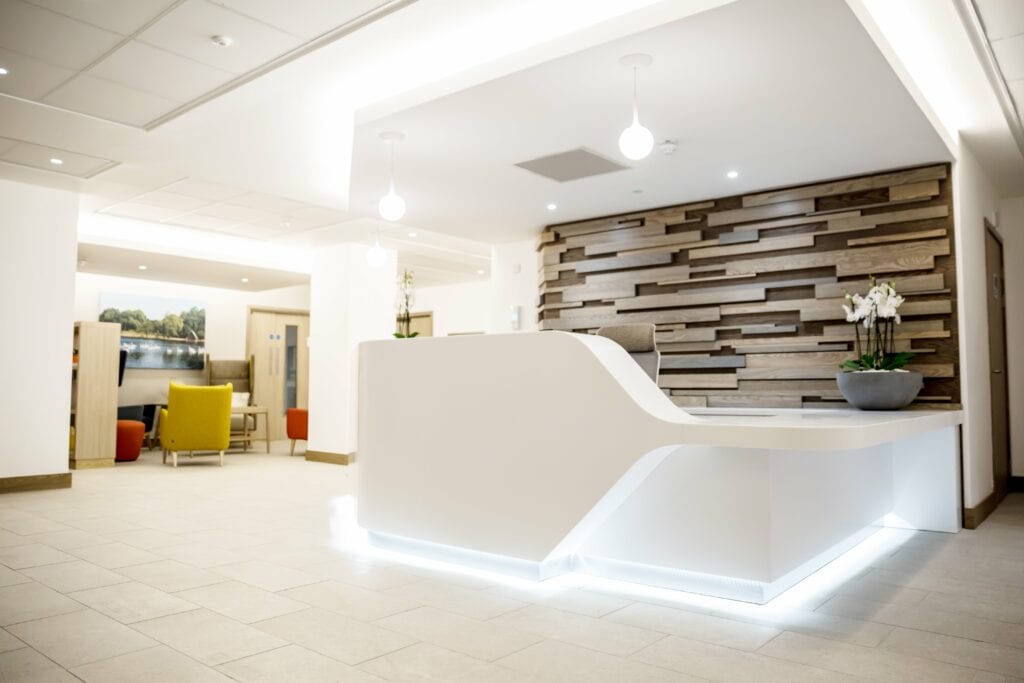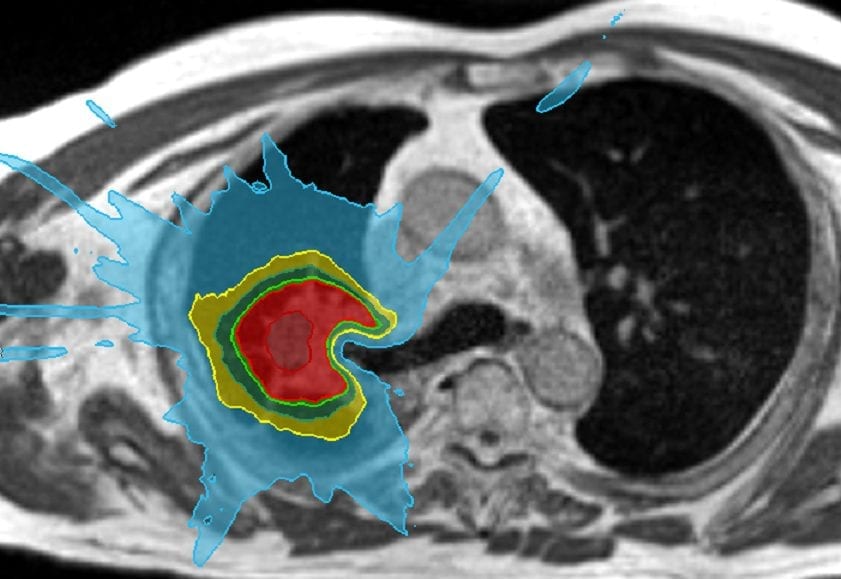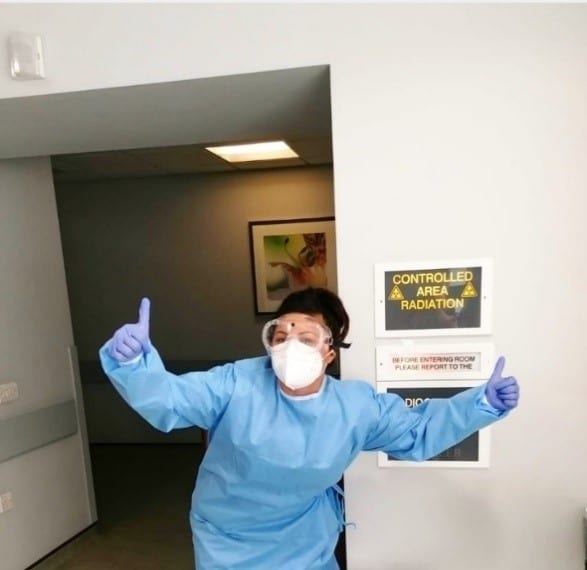GenesisCare Centre for Radiotherapy at Cromwell Hospital
Europe’s most advanced radiotherapy centre offers new hope for many cancer patients
Following a £20 million investment and refurbishment programme, the UK’s leading private cancer care provider, GenesisCare, has opened a radiotherapy super centre right in the heart of London. In partnership with Bupa Cromwell Hospital, this centre promises to extend world-class cancer diagnosis, treatment and care in the Capital, in state-of-the-art surroundings.
GenesisCare specialises in evidence-based cancer care and use of advanced radiotherapy innovations from around the world – transforming the treatment of many of the most common cancers, such as breast, prostate, lung and brain and offering new hope for patients with previously difficult-to-treat cancers such as pancreatic.
Modern day radiotherapy is changing the experience and outcome for so many people with cancer.
Every two minutes someone in the UK is diagnosed with cancer, but if you, or a loved one, is unfortunate enough to be one of them, you should also take heart from the fact that these days more than half of people will survive their cancer for at least ten years. There are many factors that are improving survival; better and earlier diagnostics, our understanding of the genetic make-up of cancers and how to target their weaknesses with drug therapies, and importantly, the increasingly effective use of radiotherapy that uses beams of energy to permanently destroy cancer cells.
As many as half of all cancers are treated with radiotherapy and it is included in the treatment plan for 40% of cancers that are cured. Modern advances are also transforming the way it is given. Recent breakthroughs have led to radiotherapy techniques that can improve outcomes by controlling tumours and reducing the need for surgery – at the same time limiting side effects and shortening treatment times from weeks to just a few days for some types of cancer.
Radiotherapy is delivered using a linear accelerator and the new GenesisCare centre for Radiotherapy at Bupa Cromwell Hospital is designed around three of the most advanced machines in the world, each capable of treating a different type of cancer. Having these three machines under one roof will make our centre Europe’s most advanced radiotherapy facility. Treatments are available for patients with health insurance and those paying for their own care:
- Gamma Knife icon – for brain and upper spinal tumours
- Varian edge – for a wide range of cancers, including breast and prostate
- MRIdian MR linac – for prostate, lung, liver and pancreatic cancer
So, what do these newer techniques offer that makes them so different from conventional radiotherapy?
- Greater accuracy and fewer side effects
- Fewer treatments may be needed
- The ability to treat difficult- to-reach or moving tumours
- Improved outcomes and quality of life after treatment
Greater accuracy, means fewer side effects
In the past, the risk of radiotherapy was that the energy beams used to destroy cancer cells could also damage healthy tissue causing unacceptable side-effects. Newer radiotherapy techniques use sophisticated in-built scanners and surface guided radiotherapy (SGRT) to carefully position and monitor patients to prevent the radiotherapy beam coming into contact with delicate internal structures. For example, when treating breast cancer, we use a technique called Deep Inspiration Breath Hold (DIBH) so that the radiotherapy beam avoids nearby heart muscle. For prostate cancer treatment we use spacers placed between the prostate and the rectum to reduce radiation exposure to healthy organs and tissue.
The MRIdian MR linac goes one step further; it has an in-built MR scanner allowing doctors to actually see what’s being treated while the patient is having their radiotherapy. GenesisCare was the first to introduce this to the UK at our centre in Oxford and we’re just installing a second at the new Centre at Bupa Cromwell Hospital. It’s a game-changing treatment for prostate tumours because it avoids the rectum and bladder which are sensitive organs.
Smaller number of treatments
New techniques for radiotherapy can also deliver effective treatment in just a small number of sessions by using powerful beams of highly focused radiation. For some cancers that can mean five or fewer treatments. This is sometimes referred to as hypo fractionated or stereotactic ablative radiation (SABR) and is very effective for prostate, lung and liver tumours. Not only does this mean fewer hospital visits – compared with 20 or 30 for some conventional radiotherapy – it can also mean fewer side effects for the patient.
Tumours that move or are difficult to reach
Everyday functions such as breathing and digesting food cause our organs to move. Sometimes tumours are so close to another moving structure such as the heart, that it’s very difficult to isolate them. In the past this has made radiotherapy particularly challenging and sometimes impossible for certain lung, liver and pancreatic cancers. MRIdian MR linac is transforming care for these patients. It allows clinicians to ‘see as they treat’ using live images of the tumour and surrounding tissue so they can continually adjust and pause the radiation beam for movements and more precise targeting of the tumour. Patients can currently be referred from anywhere in the UK to the GenesisCare centre in Oxford for this treatment and a MRIdian will be installed in London in Spring 2021.
Improved outcome and quality of life
Brain tumours can be removed either with surgery or a type of radiotherapy called stereotactic radiosurgery (SRS), which uses powerful radiation beams to destroy cancer cells. It is sometimes called ‘brain-sparing’ radiotherapy because it aims to control the tumours, while protecting healthy brain tissue – important for cognitive functions and quality of life. In London the GenesisCare neuro-oncology team are using a Gamma Knife Icon, the latest version of a world-renowned technology designed to treat brain tumours. Alongside this, the team can access specialist scanning techniques in our neuro-oncology centre in Oxford such as functional MRI and Diffusion Tractography which identify areas of the brain responsible for speech and cognition – enabling them to be avoided during treatment.
Click here for more information on GenesisCare Centre for Radiotherapy at Cromwell Hospital




